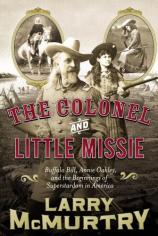The Colonel and Little Missie: Buffalo Bill, Annie Oakley, and the Beginnings of Superstardom in America
Review
The Colonel and Little Missie: Buffalo Bill, Annie Oakley, and the Beginnings of Superstardom in America
Taken as individuals, Buffalo Bill Cody and Annie Oakley were
legends of "The West." Put them together and you have a form of
entertainment that seems almost unfathomable to today's
sensibilities.
In his day "[his celebrity] was not exceeded by anyone in the
world.... Cody was one of the first performers to truly acquire
superstardom," writes Larry McMurtry, author of LONESOME DOVE, one
of the best examples of cowboy fiction (not to mention
Pulitzer-winning), as he goes the nonfiction route in THE COLONEL
AND LITTLE MISSIE.
Although not as riveting as DOVE, McMurtry does an admirable job in
explaining how Cody parlayed his reputation as a scout non-pareil
and Indian fighter into a lucrative form of theater, bringing that
daring lifestyle to areas of the country --- and the world --- to
which his exploits seemed, well, like fiction.
Over several decades Cody and his troupe put together dramatic
renditions of "fights with the noble savages," as well as other
exhibitions of western skills. When sharpshooter Annie Oakley
joined his company, their success was all but guaranteed.
McMurtry describes Cody and Oakley mostly in glowing terms,
although he does not try to make them saints; such would never do
in the modern world. Instead he depicts them realistically, minor
warts and all, along with the major characters in the development
of Cody's wild west show. The amount of work that went into such an
undertaking is truly mind-boggling, especially when the reader
takes into consideration the lack of modern technology: imagine
trying to organize and promote such an enterprise without the
benefit of phones, faxes, or computer communications. It makes the
accomplishments of Cody and his staff all the more
impressive.
McMurtry seems to get a little frustrated at times, unable to find
the definitive description of Cody. The author quotes John
Ford, the illustrious director, who "is said to have decreed that
if you have to choose between the truth and the legend, print the
legend." Many writers have followed that course when writing about
the wild west and its colorful characters.
Oakley gets short shrift; the first 140 pages of the book are
devoted almost exclusively to Cody and his "back story," with the
heroine of the story getting barely a dozen before McMurtry shifts
his focus to the troupe's European tour, beginning with Queen
Victoria's Jubilee in 1887. Indeed, many of the chapters are
teasing, needing further elucidation. Unfortunately, it is seldom
forthcoming; like Oakley's shotgun, McMurtry's style is a bit
scattershot. He jumps from discussions about Cody's shortcomings as
a businessman ("Cody was trapped by his own ambition. He couldn't
afford either to quit or not to quit") to interactions between
various principles like Cody, Oakley, Frank Butler (Oakley's
husband), Cody's numerous partners, his wife, his mistress, et.
al.; it can get a bit confusing trying to follow a timeline.
Too often he employs phrases such as "it will never be known why"
or cites conflicting reports, which the modern reader, accustomed
to instant analyses and "final answers," might also find
frustrating.
Even with all these minor annoyances, THE COLONEL AND LITTLE MISSIE
offers a fascinating look at the entertainment industry in the
pre-electronic age, as well as a peek into the lives of two
enduring American legends of the old west.
Reviewed by Ron Kaplan (RonK23@aol.com) on December 28, 2010
The Colonel and Little Missie: Buffalo Bill, Annie Oakley, and the Beginnings of Superstardom in America
- Publication Date: May 31, 2005
- Genres: Biography, Nonfiction
- Hardcover: 256 pages
- Publisher: Simon & Schuster
- ISBN-10: 0743271718
- ISBN-13: 9780743271714





